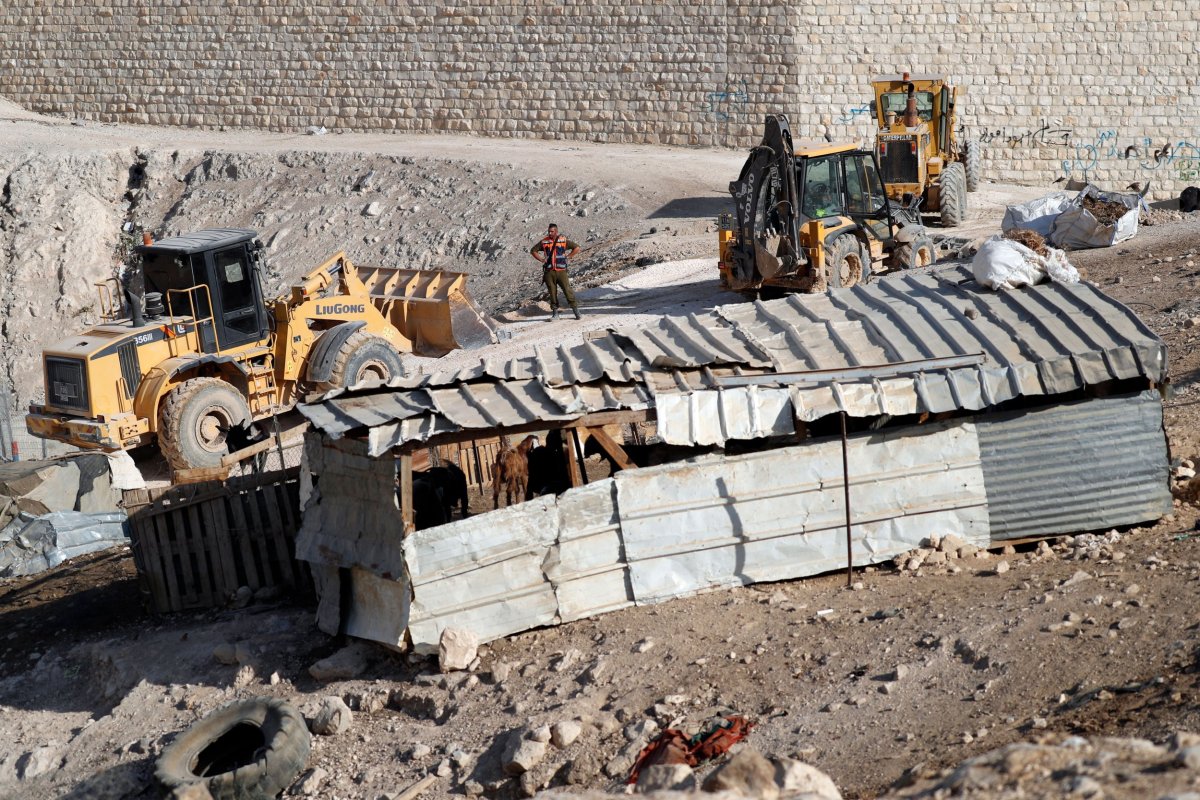The fate of the West Bank village of Khan al-Ahmar, east of Jerusalem, has been in a state of uncertainty since the planned demolition October 1st deadline ordained by the Israeli government has come and gone. Although many observers, including the Amnesty International and the European Parliament, have reminded Israel in recent days that forcible population transfers in occupied territory constitute a war crime, bulldozers and Israeli troops have been massing around the Palestinian Bedouin village over the past several weeks, awaiting the go-ahead from the government. On Sunday, Prime Minister Benjamin Netanyahu made a statement confirming the plans to demolish the village.
The tragic fate of Khan al-Ahmar is part of Israel's annexationist trend, which has worrying consequences well into the future. Israel is moving with dispatch to entrench a sovereignty claim by annexing parts or all of the West Bank. It already annexed East Jerusalem in 1967, a move that the international community condemned as illegal and has not recognized to this day. The West Bank is now clearly within Israel's sights.
Khan al-Ahmar lies in the so-called "E1" corridor, between Jerusalem and Ma'ale Adumim, one of the largest Jewish settlements in the West Bank. If Khan al-Ahmar and several other Palestinian villages are successfully demolished, then Israel has acquired the territorial contiguity around E1 to build new Jewish settlements and to sweep in Ma'ale Adumim and four other nearby settlements within Jerusalem's expanded borders. Legislation to this effect—dubbed the 'Jerusalem and her Daughters Bill'—has been debated in the Knesset.
Meanwhile, the rest of the West Bank is becoming the new frontier for Israeli political leaders who are demanding more sweeping annexation moves. Already, the infrastructures of the West Bank – the highway, communications, water and electricity systems – are firmly integrated into Israel's domestic network. The West Bank economy is governed by a single customs union, which benefits the stronger Israeli economy, while leaving the anemic Palestinian economy to wither. Israel is in full military control of 'Area C', which makes up 60 percent of the West Bank and is where its 230 settlements and more than 400,000 settlers are located. The current Israeli leadership intends to keep this land permanently.
In the six-party coalition that governs Israel, not one party formally supports a two-state solution. In December 2017, the 1,000 member Likud central committee—Prime Minister Netanyahu's party—voted unanimously for a non-binding resolution that called on Likud lawmakers "to apply the laws of Israel and its sovereignty to all liberated areas of Jewish settlement in Judea and Samaria." Netanyahu has recently stated: "This is the land of our fathers, this is our land. We are here to stay, forever…There will be no uprooting of communities in the Land of Israel." Most of his cabinet ministers are even blunter.
Israel's passing of a number of laws in the Knesset over the past year, which have become a flashing green light for more formal annexation steps. The Settlement Regularization Law, enacted in 2017, allows for the retroactive legalization of settlement outposts in the West Bank that have been built on private Palestinian land. The Jewish Nation-State Law is a quasi-constitutional Basic Law, which provides, in Article 7, that: "the state views the development of Jewish settlements as a national value and will act to encourage and promote its establishment and consolidation." Other recent legislation has extended some Israeli laws to the West Bank settlements.

International law strictly prohibits these settlement and annexationist activities. The UN Security Council has stated, on many occasions, that the Israeli settlements are a grave breach of the Fourth Geneva Convention of 1949. The 1998 Rome Statute regards civilian settlements in occupied territory as a war crime. Annexation violates the Charter of the United Nations, and the International Court of Justice has ruled that "the inadmissibility of the acquisition of territory by war or force" has achieve the status of a foundational principle in international law.
Michael Sfard, a noted Israeli human rights lawyer, has recently written that Israel's "…goal is clear: a single state containing two peoples, only one of whom has citizenship and civil rights." Yet, despite Israel's ongoing record of non-compliance with the directions of the international community, it has rarely paid a meaningful price for its defiance, and its appetite for entrenching its annexationist ambitions in East Jerusalem and the West Bank has gone largely unchecked. For the past 50 years, the international community has been playing checkers while Israel has been playing chess.
Alas, neither international law or UN resolutions are self-executing. Only after decisive action by the United Nations insisting that Israel must either fully annul its annexations and relinquish its occupation or be prepared to bear the full consequences of international accountability, will we start moving towards a compassionate peace in the Middle East.
Michael Lynk is an Associate Professor of Law at Western University, London, Ontario, Canada. He serves as the UN Special Rapporteur for the situation of human rights in the Palestinian Territory occupied since 1967.
The views expressed in this article are the author's own.
Uncommon Knowledge
Newsweek is committed to challenging conventional wisdom and finding connections in the search for common ground.
Newsweek is committed to challenging conventional wisdom and finding connections in the search for common ground.
About the writer
To read how Newsweek uses AI as a newsroom tool, Click here.








